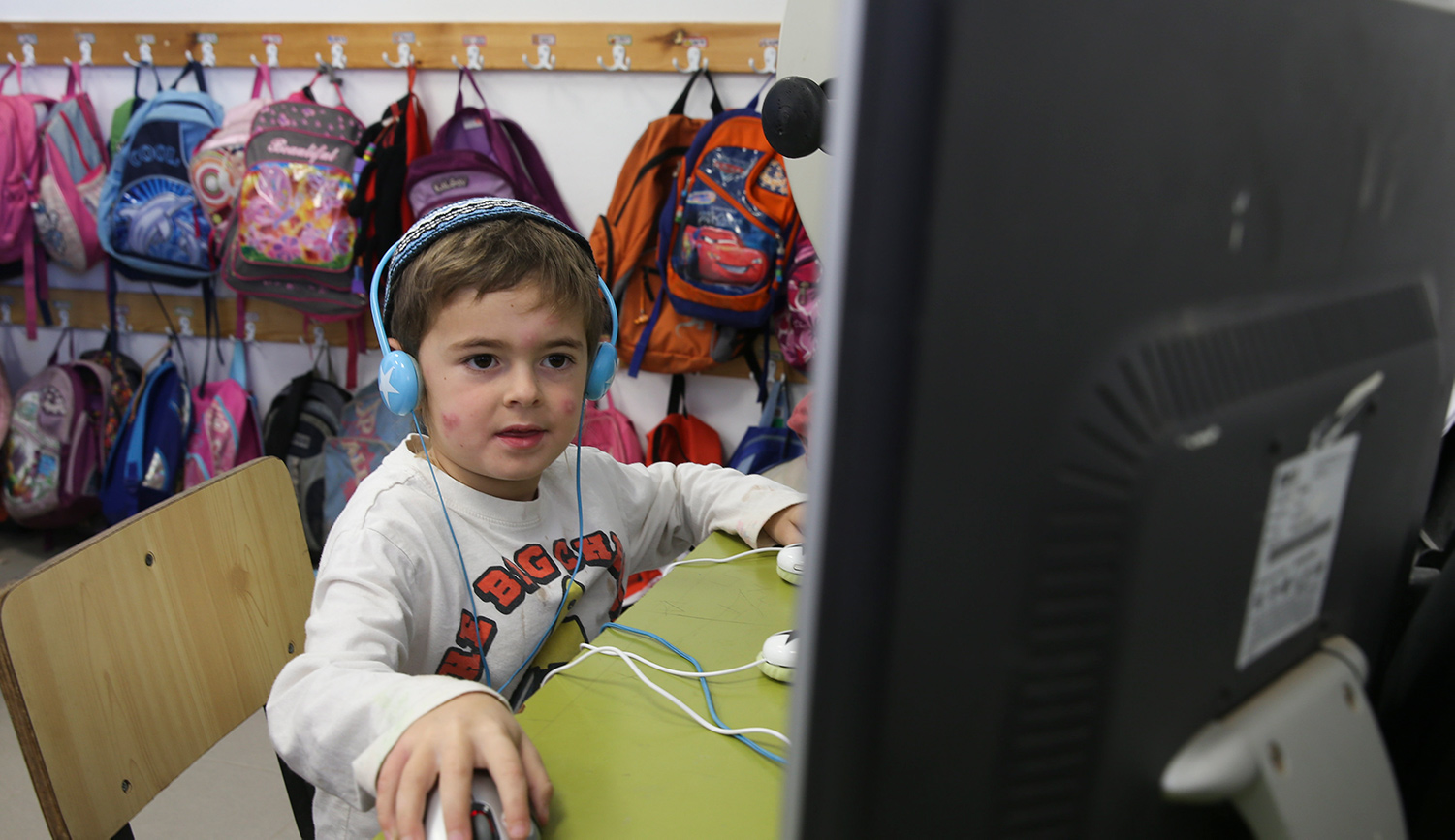In his excellent essay, Eric Cohen argues that we are living in a moment of both disruption and innovation in Jewish education. Whether we like it or not, some of the ways we have always done things are falling by the wayside—a global pandemic has assured that—and we can, and should, leverage that disruption and turn it into innovation.
Most of his recommendations are, in my view, salient, provocative, and, if implemented, hold great promise. I have little to add to them. As Cohen correctly points out, the ubiquity of cheap videoconferencing technology has created an opportunity to expose many thousands of students to world-class teachers and thinkers who do not live in their own neighborhoods. There’s likewise an opportunity to bring quality education to out-of-the-way Hebrew schools, located in far-flung corners of the United States. And there’s similarly a chance to “flip the classroom,” an idea pioneered by Salman Khan through his world-famous Khan Academy.
But to all this excitement, I would add a note of caution, which grows out of my own experience as the founder of the Jewish educational Internet startup Aleph Beta. In thinking about pedagogic innovation we shouldn’t focus too much on technology. New technologies can do much to improve our educational system, but that alone will not save us. As we envision radical changes to Jewish education, we need not just to ask “What,” and “How,” but also “Why.”
I learned this lesson when a few gentlemen arrived at our offices with a proposal to transform Aleph Beta into an educational juggernaut, at least in their telling. They’d give us millions of dollars to use our technological knowhow to create a “school in a box”—a kind of high-tech video resource for all things Jewish that all schools could use. Wrestling with that tempting offer—an offer we ultimately turned down—forced a certain kind of clarity on us. It forced us to grapple with our “why”?
To be sure, we had gotten pretty good at the “technology thing.” Our first animated videos were primitive: little stick figures, a scratchy microphone designed for computer gaming. But then we got better at it. The tools improved. We hired some talented folks, and they started figuring things out. Flat-design animation. Sound editing. Storyboarding. Seamlessly integrating music into videos. But were we really, at the core, a Jewish technology company?
What I came to realize is that ultimately, we weren’t. Technology is crucial to what we do, but it is merely a tool. I’ve seen the pattern time and again observing my friends and colleagues in the Jewish educational sphere. We become enamored by the promise of technology to make us faster, better, cheaper. And that faster-cheaper-betterness quickly becomes an end rather than a means. It’s a seductive trap.
Way back when, the Bible’s very first technological entrepreneurs made this mistake. They set about doing something that, on its face, is pretty innocuous: building a tower in the land of Babel, with its top stretching into the very heavens. As it turns out, God didn’t like what He saw, and He confounded their plans.
One of the great mysteries of this episode revolves around what, exactly, the Lord found so objectionable. What’s so bad about building a tower? Some talmudic sages suggest that the people were guilty of a form of idol-worship. But the text itself doesn’t say anything about that. Nor does it mention rebellion against God. To the contrary, the builders didn’t seem to have any theological motivation at all.
The answer may well be that they confused the means and the end. Idolatry is when you take a mere tool and elevate it into something ultimate—something that can be worshipped, an end in and of itself. The story of the Tower of Babel begins with the tools: “Come, let us make bricks.” But interestingly, the people don’t have a plan for what to do with them. Only after they’ve made them do they decide to build a tower. The manufacture of bricks gives rise to another endeavor: “Come, let us build a tower.” But what is the purpose of the tower? It doesn’t serve any particular need. It is not an office building. It doesn’t contain condominiums or solve a housing crisis. It is just something they can create once they have the bricks.
In short, tools beget more tools, and in the end, they become nothing but monuments to one’s own creativity and prowess. Instead of technology being the servant of humanity, humanity becomes the slave of technology. It’s no coincidence that the next time bricks appear in the Bible, they are being made by Israelite slaves in Egypt.
This is the mistake we came close to making at Aleph Beta: letting ourselves be slaves to our own technological success. The folks offering us millions saw our value in our ability to explain things cogently in video format. But at the end of the day, technology wasn’t what defined us. It was our “why” that defined us: to help the people of the book fall in love with the book all over again.
I bring this up because Cohen is absolutely right when he writes that, whether we like it or not, we are living through a revolution in the way we think about Jewish education. But if we really want to seize the moment, we need not only to think about the tools that we use to teach, but the goals of Jewish teaching itself. What, really, are we trying to do when we educate our kids Jewishly? As Lewis Carroll is reputed to have said, if you don’t know where you are going, any road is sure to take you there.
Perhaps it took a pandemic to throw into relief some of the shakiness of our “why.” When the “how” of Jewish education changes—when classes go from being in person to being on Zoom—why is it that parents suddenly consider switching their children from day school to public school? When the charisma of the teacher is gone and replaced by a shaky two-dimensional image; when the camaraderie of a child’s social group isn’t quite there anymore, what is left?
There are many ways, of course, to speak about the goals of Jewish education. We might say we are helping our children become God-fearing people. We might say we are seeking to pass a heritage down to them. We might say we are seeking to provide a Jewish social context for their lives, helping them befriend those who share their religious traditions and principles, so that they will become part of a community whose members support one another religiously, socially, and educationally. All that is certainly true. But I think we are also trying to help them fall in love.
The Jewish people isn’t called “the People of the Book” for nothing. The fact is, over the course of thousands of years, we’ve had a romance with this book of ours. A romance imagined by one its most fundamental passages—the Sh’ma.
The opening paragraph of the Sh’ma (Deuteronomy 6:4-9) contains a curious turn of phrase. Immediately after adjuring us to love God with all our hearts and with all our souls, it states “And these words that I command you today shall be on your hearts.” On its face, this is a strange thing to say about a commandment, even a commandment to love. Normally, we think of commandments as things to be obeyed. But we are not just bidden to obey God’s commands, but to “have them on our hearts”—to relate to them on emotionally. The great book that we as a people have been given is not just a rulebook. It’s a book we’re mean to fall in love with.
The rest of the passage tells us how. “Teach them to your children. And speak of them. When you sit at home, and when you go on the road. When you go to sleep, and when you wake up.”
If you really love the book, you wouldn’t just keep what’s in it to yourself. You would want to share it with those closest to you. You would teach it to your children. That is the Torah’s view of Jewish education. It is something that emerges organically out of love. It is a natural byproduct of the romance between a people and their book.
The Sh’ma continues: if you really love what’s written in the book, you’d be speaking about it. That’s what people in love do. They won’t stop talking about their beloveds. It wouldn’t matter where you were—in the house or on the road—or whether it is morning or evening. Wherever and whenever, you’d be speaking about the Torah. It would be the last thing on your lips at night and the first thing on your lips in the morning. Which leaves us with a tantalizing, implicit image: the Torah should be the stuff of your dreams. Even asleep, you’d encounter thoughts of this sacred text.
Now, the connection to Torah being described here might appear a lofty and unattainable ideal—something to be preached but not really lived, except perhaps by the saintly few. But I wonder if it is something that can be lived by the Jewish people as a whole. I wonder if it is something that we, as a nation, can strive to aspire to, as perhaps the central goal of the education we give our kids. I wonder if that’s not too much to ask for.
How, exactly, do we get there? That’s a topic for another conversation. If you want my personal answer, feel free to peruse a few videos at alephbeta.org and you can get a sense of my approach. But for now, suffice it to say that I think we often underestimate the inherent power of our core texts. We tell children that the Torah is deep and revelatory. But do they have to take that as an article of faith, or can we actually show them that depth and beauty? Can we give them the tools to discover these things with their own minds?
There are certain Jewish experiences that can shape a life forever. One of them is an encounter with the Land of Israel. The statistics tell us that Birthright trips of a mere ten days significantly reduce the rate of intermarriage among their participants. Why, we might wonder, are such trips so effective? What makes the Birthright experience one of the great successes of our generation?
The answer, I would suggest, is that Birthright offers its participants a close encounter with something wondrous and vastly larger than themselves: the Land of Israel and the history of the Jewish people. These things may feel like mere abstractions to your average American university student. But there is something about sifting through dirt, with your own bare hands, at an archaeological dig on a lonely hillside outside of Modi’in, and coming across a coin from the Bar Kokhba revolt—something awe-inspiring. Moments like these can be humbling and life-changing.
But something else can achieve a similar result: our Torah. If we can teach students the skills to take a profound journey into the hearts of our texts, we’ll give them the ability to reach across time, and to touch something authentic—something, like that coin, that they can dust off and make their own. We will renew our students’ connection with their intellectual and spiritual birthright.
I don’t think this vision of Jewish education is utopian. If Aleph Beta, working together with our existing institutions, can help with this, I’d be more than gratified. We shouldn’t settle for a mere revolution in technology in the classroom. That, relatively speaking, is the easy part. The hard part, the important part, is crafting an educational experience that makes the Book of Books come alive, that rekindles the romance.
More about: Coronavirus, Education, Politics & Current Affairs, Technology





